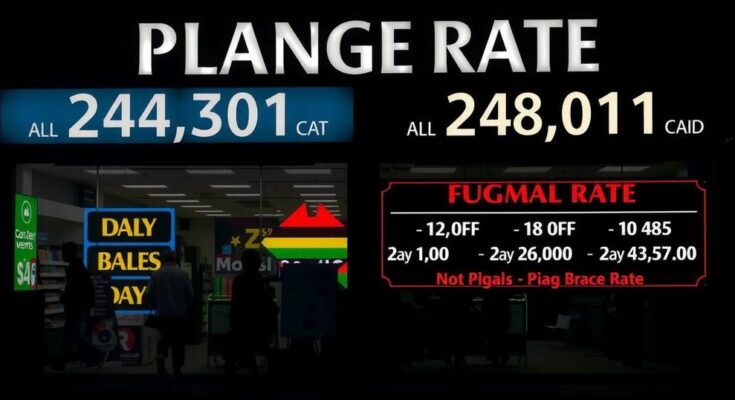Major retailers in Zimbabwe are warning of potential store closures due to an overvalued official exchange rate mandated by the government. The newly launched gold-backed currency, ZiG, has lost significant value on the black market, affecting competitiveness and forcing retailers to raise prices. The Retailers Association has urged for policy changes to reflect true market conditions, highlighting a crisis in confidence in the country’s currency.
In a significant warning, major retailers in Zimbabwe have expressed concerns over potential store closures due to the government’s insistence on an official exchange rate they consider overvalued, posing threats to their market competitiveness. The new gold-backed currency, known as ZiG (Zimbabwe Gold), has experienced severe devaluation, losing nearly 80% of its value on the black market, where it is currently traded at rates between 20 to 26 ZiG to one US dollar. Under official guidelines, formal retailers are mandated to set their prices according to the government-required exchange rate of 14.8 ZiG to one dollar; however, this regulation is causing challenges. Retailers, including major establishments such as OK Zimbabwe, Spar, and TM Supermarkets, which operates under South Africa’s Pick N Pay brand, report that the official rate is inflating their prices compared to informal market outlets, leading to a decline in customer traffic. The Retailers Association of Zimbabwe (RAZ) articulated their distress in a letter directed to the Ministry of Finance, asserting that the current economic conditions are “untenable” and could result in the closure of businesses unless authorities implement protective policy adjustments for the formal retail industry. Furthermore, retailers indicated they must comply with the official exchange rate; however, their suppliers are charging prices based on the black market rate, compelling them to raise their retail prices to maintain profitability. They emphasized the need for a pricing model that reflects real-time fluctuations in market exchange rates, which would enhance their competitive edge while effectively managing operational costs. A comment from the treasury remains pending regarding this ongoing situation. This predicament occurs as Zimbabwe navigates its sixth attempt at establishing a stable currency over the past 15 years. Economists have indicated that the devaluation of the ZiG further highlights the populace’s lack of confidence in this new currency.
The economic framework of Zimbabwe has faced considerable instability, evidenced by the country’s history of currency devaluations and hyperinflation. Following several unsuccessful attempts at instituting a stable currency, the government launched the Zimbabwe Gold (ZiG) currency in an effort to stabilize the economy. However, as retailers are mandated to price based on an official exchange rate, discrepancies arise when accounting for black market rates, which significantly differ and impact retail pricing strategies. The Retailers Association’s concerns reflect broader issues regarding market regulations, currency stability, and the viability of formal businesses operating under restrictive pricing conditions.
In summary, leading retailers in Zimbabwe are sounding alarm bells over store closures due to the government’s stringent adherence to an official exchange rate that they deem unrealistic. The significant discrepancy between this rate and current black market valuations is exacerbating the challenges faced by businesses, compelling them to re-assess their pricing models. Urgent intervention from financial authorities is critical to avert potential economic downturns within the retail sector, which plays a vital role in the overall economy.
Original Source: www.investing.com




